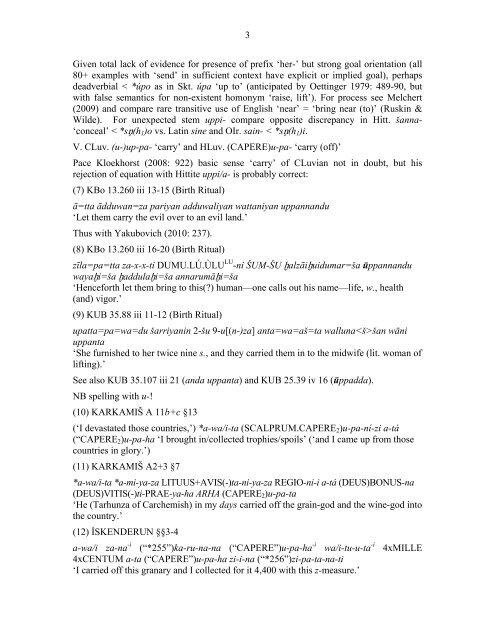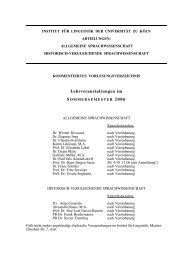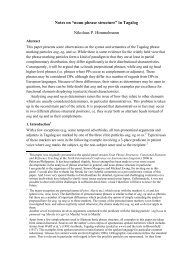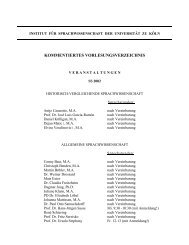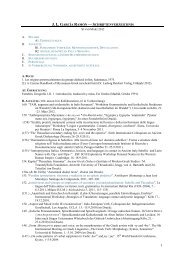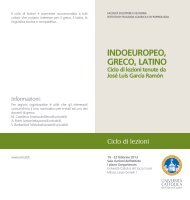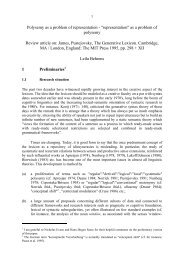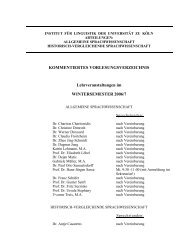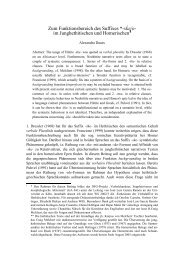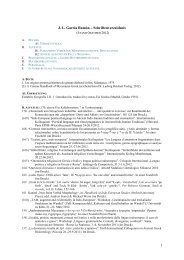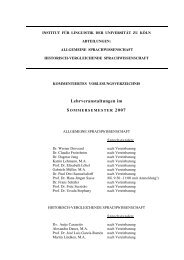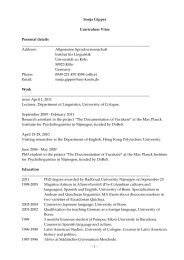Topics in Anatolian Historical Grammar Prof. Dr. H. Craig Melchert
Topics in Anatolian Historical Grammar Prof. Dr. H. Craig Melchert
Topics in Anatolian Historical Grammar Prof. Dr. H. Craig Melchert
Create successful ePaper yourself
Turn your PDF publications into a flip-book with our unique Google optimized e-Paper software.
3<br />
Given total lack of evidence for presence of prefix ‘her-’ but strong goal orientation (all<br />
80+ examples with ‘send’ <strong>in</strong> sufficient context have explicit or implied goal), perhaps<br />
deadverbial < *úpo as <strong>in</strong> Skt. úpa ‘up to’ (anticipated by Oett<strong>in</strong>ger 1979: 489-90, but<br />
with false semantics for non-existent homonym ‘raise, lift’). For process see <strong>Melchert</strong><br />
(2009) and compare rare transitive use of English ‘near’ = ‘br<strong>in</strong>g near (to)’ (Rusk<strong>in</strong> &<br />
Wilde). For unexpected stem uppi- compare opposite discrepancy <strong>in</strong> Hitt. šanna-<br />
‘conceal’ < *s(h 1 )o vs. Lat<strong>in</strong> s<strong>in</strong>e and OIr. sa<strong>in</strong>- < *s(h 1 )i.<br />
V. CLuv. (u-)up-pa- ‘carry’ and HLuv. (CAPERE)u-pa- ‘carry (off)’<br />
Pace Kloekhorst (2008: 922) basic sense ‘carry’ of CLuvian not <strong>in</strong> doubt, but his<br />
rejection of equation with Hittite uppi/a- is probably correct:<br />
(7) KBo 13.260 iii 13-15 (Birth Ritual)<br />
ā=tta ādduwan=za pariyan adduwaliyan wattaniyan uppannandu<br />
‘Let them carry the evil over to an evil land.’<br />
Thus with Yakubovich (2010: 237).<br />
(8) KBo 13.260 iii 16-20 (Birth Ritual)<br />
zīla=pa=tta za-x-x-ti DUMU.LÚ.ÙLU LU -ni ŠUM-ŠU ḫalzāiḫuidumar=ša ūppannandu<br />
wayaḫi=ša ḫaddulaḫi=ša annarumāḫi=ša<br />
‘Henceforth let them br<strong>in</strong>g to this(?) human—one calls out his name—life, w., health<br />
(and) vigor.’<br />
(9) KUB 35.88 iii 11-12 (Birth Ritual)<br />
upatta=pa=wa=du šarriyan<strong>in</strong> 2-šu 9-u[(n-)za] anta=wa=aš=ta wallunašan wāni<br />
uppanta<br />
‘She furnished to her twice n<strong>in</strong>e s., and they carried them <strong>in</strong> to the midwife (lit. woman of<br />
lift<strong>in</strong>g).’<br />
See also KUB 35.107 iii 21 (anda uppanta) and KUB 25.39 iv 16 (ūppadda).<br />
NB spell<strong>in</strong>g with u-!<br />
(10) KARKAMIŠ A 11b+c §13<br />
(‘I devastated those countries,’) *a-wa/i-ta (SCALPRUM.CAPERE 2 )u-pa-ní-zi a-tá<br />
(“CAPERE 2 )u-pa-ha ‘I brought <strong>in</strong>/collected trophies/spoils’ (‘and I came up from those<br />
countries <strong>in</strong> glory.’)<br />
(11) KARKAMIŠ A2+3 §7<br />
*a-wa/i-ta *a-mi-ya-za LITUUS+AVIS(-)ta-ni-ya-za REGIO-ni-i a-tá (DEUS)BONUS-na<br />
(DEUS)VITIS(-)ti-PRAE-ya-ha ARHA (CAPERE 2 )u-pa-ta<br />
‘He (Tarhunza of Carchemish) <strong>in</strong> my days carried off the gra<strong>in</strong>-god and the w<strong>in</strong>e-god <strong>in</strong>to<br />
the country.’<br />
(12) İSKENDERUN §§3-4<br />
a-wa/i za-na -i (“*255”)ka-ru-na-na (“CAPERE”)u-pa-ha -i wa/i-tu-u-ta -i 4xMILLE<br />
4xCENTUM a-ta (“CAPERE”)u-pa-ha zi-i-na (“*256”)zi-pa-ta-na-ti<br />
‘I carried off this granary and I collected for it 4,400 with this z-measure.’


